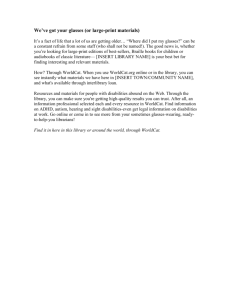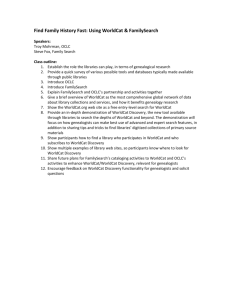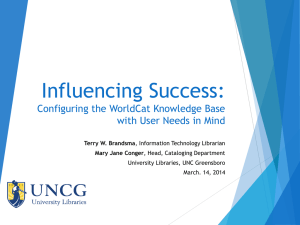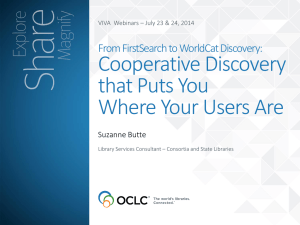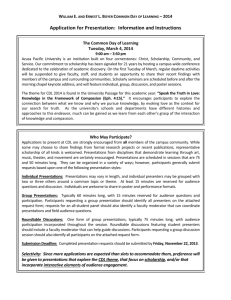UC Berkeley
advertisement
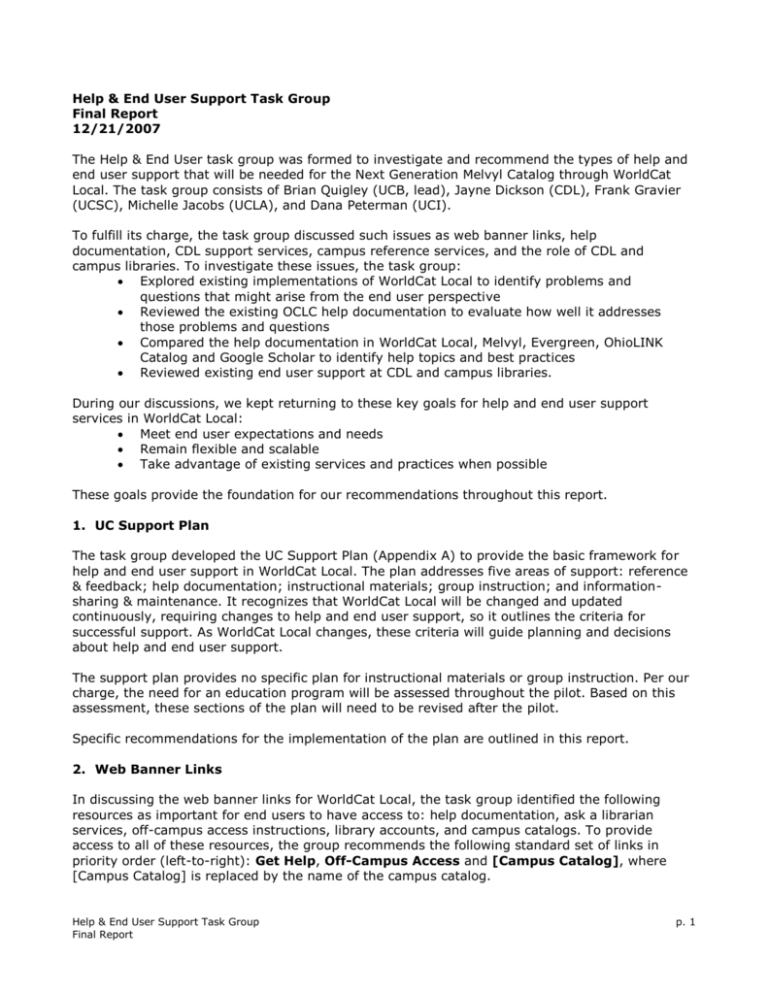
Help & End User Support Task Group Final Report 12/21/2007 The Help & End User task group was formed to investigate and recommend the types of help and end user support that will be needed for the Next Generation Melvyl Catalog through WorldCat Local. The task group consists of Brian Quigley (UCB, lead), Jayne Dickson (CDL), Frank Gravier (UCSC), Michelle Jacobs (UCLA), and Dana Peterman (UCI). To fulfill its charge, the task group discussed such issues as web banner links, help documentation, CDL support services, campus reference services, and the role of CDL and campus libraries. To investigate these issues, the task group: Explored existing implementations of WorldCat Local to identify problems and questions that might arise from the end user perspective Reviewed the existing OCLC help documentation to evaluate how well it addresses those problems and questions Compared the help documentation in WorldCat Local, Melvyl, Evergreen, OhioLINK Catalog and Google Scholar to identify help topics and best practices Reviewed existing end user support at CDL and campus libraries. During our discussions, we kept returning to these key goals for help and end user support services in WorldCat Local: Meet end user expectations and needs Remain flexible and scalable Take advantage of existing services and practices when possible These goals provide the foundation for our recommendations throughout this report. 1. UC Support Plan The task group developed the UC Support Plan (Appendix A) to provide the basic framework for help and end user support in WorldCat Local. The plan addresses five areas of support: reference & feedback; help documentation; instructional materials; group instruction; and informationsharing & maintenance. It recognizes that WorldCat Local will be changed and updated continuously, requiring changes to help and end user support, so it outlines the criteria for successful support. As WorldCat Local changes, these criteria will guide planning and decisions about help and end user support. The support plan provides no specific plan for instructional materials or group instruction. Per our charge, the need for an education program will be assessed throughout the pilot. Based on this assessment, these sections of the plan will need to be revised after the pilot. Specific recommendations for the implementation of the plan are outlined in this report. 2. Web Banner Links In discussing the web banner links for WorldCat Local, the task group identified the following resources as important for end users to have access to: help documentation, ask a librarian services, off-campus access instructions, library accounts, and campus catalogs. To provide access to all of these resources, the group recommends the following standard set of links in priority order (left-to-right): Get Help, Off-Campus Access and [Campus Catalog], where [Campus Catalog] is replaced by the name of the campus catalog. Help & End User Support Task Group Final Report p. 1 Get Help Rationale: End users expect to find Help in the upper-right corner of the interface, based on their experiences with other web resources and software programs. This link can provide end users with access to both help documentation and ask a librarian services. Off-Campus Access Rationale: End users often ask staff about off-campus access; in fact, it is one of our most frequently asked questions. While they do not need this information to access WorldCat Local, end users will need it to access the licensed electronic resources that they find with it. [Campus Catalog] Rationale: Based on their experience with other library catalogs, many end users will expect to be able to view their library accounts from WorldCat Local. During the pilot, frustrated users may want to switch back to their familiar campus catalogs. Since end users access their library accounts via their campus catalogs, this link will meet both needs. While the task group finds the [Campus Catalog] link to be the most desirable option for the pilot, we acknowledge the following concerns about it: It does not provide direct access to library accounts, as many end users would expect from a library catalog. It may discourage end users from exploring the pilot project by diverting them back to campus catalogs too easily. The Web Banner Links Recommendation (Appendix B) specifies the link text and URLs for each UC instance of WorldCat Local. These links, especially to the campus catalogs, should be reevaluated if the pilot is successful. The following mock-up shows how the web banner links might look in the Melvyl instance: Next Steps: Establish the URLs for Get Help and communicate them to OCLC 3. Help Documentation After reviewing the help documentation in WorldCat Local, Melvyl, Evergreen, OhioLINK Catalog and Google Scholar, the task group identified the following criteria for our help documentation: Focus on end user needs Be easy to find and use Be specific, succinct and streamlined Prioritize the most important information Address textual and visual learning styles Help & End User Support Task Group Final Report p. 2 Be easy to implement and maintain OCLC refers end users to its WorldCat.org help documentation for support in WorldCat Local, but the task group finds that this help documentation does not meet all the criteria. We recommend that UC provide its own help documentation, and we have provided a Sample Get Help Page (Appendix C) as an example. Since they already have experience hosting information about systemwide resources, we further recommend that CDL take responsibility for hosting and maintaining the help documentation. The task group would work with CDL staff on the initial implementation. The task group also recommends that our help documentation provide direct access to the appropriate Ask a Librarian service for each instance. This should be done in a way that is easy for the end user to find but also easy to implement and maintain. We believe the best solution is to create a separate Get Help page for each instance, but hosted on one CDL server to take advantage of server-side includes (SSI). When our help documentation needs to be edited, a change in one SSI file will populate all instances – therefore, maintaining these eleven pages will require about the same effort as maintaining one page. If this option is not possible, as a backup, we recommend linking to the UC-eLinks Ask a Librarian page: http://ucelinks.cdlib.org:8888/sfx_local/img/docs/Ask.html. While we are recommending that UC provide its own help documentation, the OCLC help documentation will also remain available to our end users in the Home menu and the footer. There are sections of the OCLC help documentation that should be revised for accuracy and clarity. We have compiled the following list of suggested improvements to OCLC help documentation as examples: Add information about truncation: The truncation symbol is a question mark (environment? finds environment, environments, environmental, environmentalist, etc.). Add information about phrase searching: For phrase searching, put quotation marks around your words (“space needle”). Add definitions of formats: <new section – requires input from OCLC>. Add sources of the articles in WorldCat Local and refer to additional article sources: This interface includes citations for articles from the following sources: ERIC (education); MEDLINE (medicine and health); GPO (U.S. government publications); and ArticleFirst (articles from a wide range of journals in all subjects). Links may be provided to articles available in full-text or print from your library. Note: Your library may have a number of other article databases available for your use. Consult your library website or librarian for more information. Expand information about relevancy: WorldCat.org's proprietary algorithm produces relevancy ranking for a keyword search by evaluating the appearance and proximity of the searched terms in the title, subject and author fields within WorldCat records. Primary weight is given to title; secondary and tertiary weights are given respectively to author and subject. The algorithm also matches against other bibliographic fields, but these three receive the most emphasis. Add proxy servers and virtual private networks as options for connecting from home: In order to reach the online resources licensed by your library, you will need to Help & End User Support Task Group Final Report p. 3 login to your library membership account. Some libraries use a proxy server or virtual private network (VPN) to accomplish this. Consult your library website or librarian for more information. Next Steps: Identify CDL staff to implement and maintain Get Help pages Work with CDL staff on initial implementation of these pages Monitor the pilot project to identify necessary changes to Get Help pages Communicate necessary changes to CDL staff 4. Reference & Feedback Services In reviewing existing services, the task group agreed that CDL and campus libraries have already established practices and procedures for handling questions and feedback. We see no reason to dismiss these services and develop our own end user support for WorldCat Local. Linking to existing services will allow us to meet our criteria for end user support: Be easy to find and use Be easy to implement Acknowledge receipt of the question (“open the loop”) Respond or refer in a timely manner (“close the loop”) Distribute traffic among CDL and campus libraries Take advantage of existing services and procedures Share knowledge among CDL, OCLC and campus libraries Existing services include the CDL Help Desk, Ask a Librarian services and Reference Desks. CDL and campus libraries provide email, chat, phone and in-person support through these services. Additionally, most campuses participate in the Ask a UC Librarian chat service. As mentioned before, the task group recommends that we provide direct access to these services through an Ask a Librarian link on our Get Help pages. The task group has identified the following links to reference services from UC-eLinks and library home pages (where these differ, the links have been highlighted): From UC-eLinks From Library Home Pages UC Berkeley (pending) UC Davis UC Irvine UC Los Angeles UC Merced (email) UC Riverside UC San Diego UC San Francisco UC Santa Barbara UC Santa Cruz UC Office of the President (email) Lawrence Berkeley National Lab (email) Lawrence Livermore National Lab (email) UC UC UC UC UC UC UC UC UC UC Berkeley Davis Irvine Los Angeles Merced Riverside San Diego San Francisco Santa Barbara Santa Cruz End users will also be able to ask questions and send comments from the Feedback link in the WorldCat Local footer. For all instances, the task group recommends that this form be sent to both the CDL Help Desk and OCLC. This will keep both parties informed of end user feedback. However, we also recommend that the CDL Help Desk take primary responsibility for responding Help & End User Support Task Group Final Report p. 4 to this feedback. They have established workflows and practices for handling feedback. Per these practices, they will refer questions and comments to OCLC or campus libraries as needed. Next Steps: Confirm the URLs for Ask a Librarian services at each campus 5. Embedded Search Page Template & Other Instructional Materials In addition to CDL and OCLC, the task group recognizes that campus libraries may want to provide additional help to their end users. Based on our review of existing WorldCat Local implementation, and our own experiences, the task group identified the following criteria for webpages and instructional materials about WorldCat Local: Focus on end user needs Be specific, succinct and streamlined Prioritize the most important information Address multiple learning styles Be adaptable Be shared Campus libraries will have the ability to embed the WorldCat Local search box on their webpages, but this provides little context to the user. To supply this context, and answer the most important questions about WorldCat Local, the task group developed an Embedded Search Page Template (Appendix D) for campus libraries. Based on the University of Washington (UW) and Peninsula Library System (PLS) examples, the template provides convenient access to the most important information about WorldCat Local, including search tips and evolving coverage. UW Libraries WorldCat Local Search Information http://www.lib.washington.edu/about/worldcatlocal/what.html PLS WorldCat Search http://www.plsinfo.org/features/worldcat.html Campus libraries may also choose to develop their own instructional materials - such as web guides, print handouts and screencasts - but there is no specific plan for these materials during the pilot. Per our charge, the need for an education program will be assessed throughout the pilot with recommendations to follow. However, if campus libraries develop their own instructional materials, the task group recommends that they share them with all campuses through the CDL Instructional Materials page: http://www.cdlib.org/inside/instruct/. Next Steps: Share the embedded search page template with campus library groups responsible for approving and implementing it on their campuses 6. Education Program There is no specific plan for end user education during the pilot. Per our charge, the need for an education program will be assessed throughout the pilot with recommendations to follow. Next Steps: Review education programs for existing library catalogs to identify learning objectives and best practices Learn about other education programs for WorldCat Local by contacting staff at existing implementations Help & End User Support Task Group Final Report p. 5 Continue to explore WorldCat Local from the end user perspective to assess the need for an education program Discuss these issues after the pilot and make recommendations 7. Information-Sharing & Maintenance To be effective, help and end user support needs to be based on current and accurate information. As a “perpetual beta” project, WorldCat Local will be updated and improved continuously. New features and improvements need to be communicated to reference staff, instruction staff and web managers. Common problems and solutions need to be communicated as well. The CDL Users Council, consisting of liaisons from each campus and non-UC partners, provides an existing channel for sharing information about WorldCat Local. According to the charge, each liaison “is responsible for communicating information between the CDL and his/her institution concerning use of the CDL tools, services and collections.” In particular, liaisons are responsible for the following duties: Monitor communications from the CDL concerning changes, new collections and services, maintenance or problems. Ensure that appropriate staff members receive information, either directly from the CDL or through other local communication mechanisms. Monitor, interpret, summarize, and evaluate comments on CDL collections and services from staff and users. In order not to proliferate the forming of more groups, and to take advantage of existing ones, the task group recommends that during the pilot the CDL Users Council be given responsibility for sharing information about WorldCat Local, especially at the operational level. This includes relaying comments and suggestions from end users and library staff to CDL, as well as communicating information from CDL to library staff. Expanding these responsibilities to WorldCat Local will help keep staff informed so that reference, instruction and web pages remain accurate. Help & End User Support Task Group Final Report p. 6
